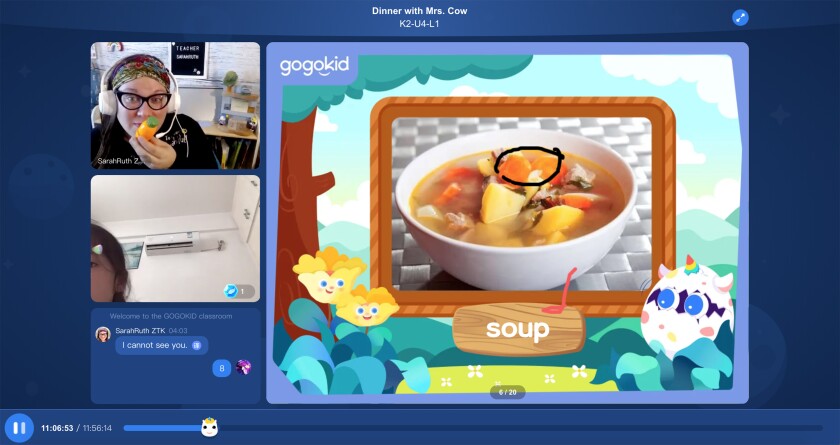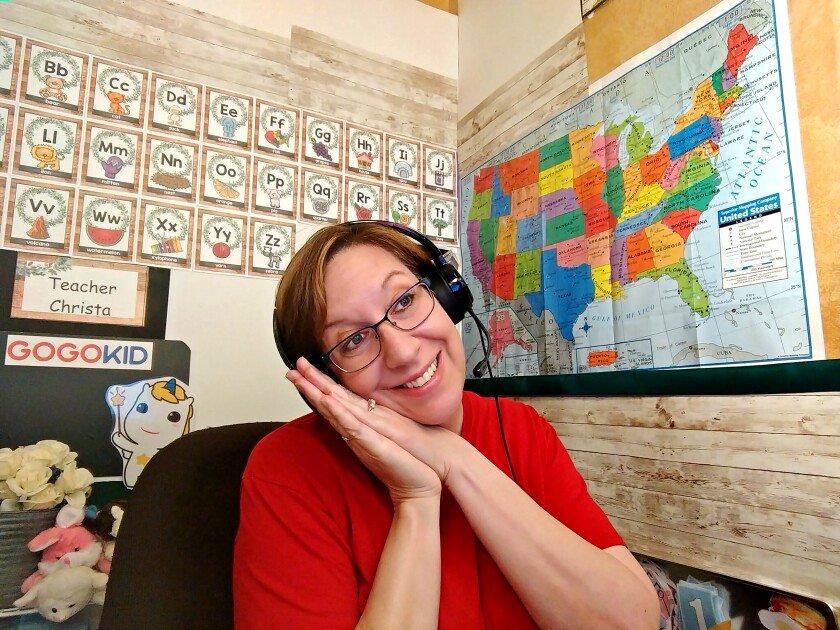Christa Kacer-Reynolds wakes up in darkness at her home in northeast Iowa most mornings, setting her alarm for 3:30 so she has time to prep for class. A little before 5, she opens her laptop, signs onto a service called GoGoKid, and waits for her first student of the day to log on from their home on the other side of the world.
For the next three hours, she teaches young children in China how to speak English, playing and singing with them through the computer screen. The youngest students learn the basics: colors, foods, mom and dad. The older kids — her oldest regular student is 8, though students into their teens use the platform — learn geography and feelings, stringing together simple conversations.
Kacer-Reynolds has a civil engineering degree, but she stumbled into online ESL (English as a second language) teaching nearly a year ago, when she was looking for a way to work while also home-schooling her children.
“I didn’t realize how much I would love my job and fall in love with my students,” she said. One student started with Kacer-Reynolds right after turning 3, and the teacher has spent more than 100 early-morning sessions with the girl in just the last year. “It’s neat to get to watch them grow and learn.”
The money helps, too. “Financially, it’s a big chunk,” Kacer-Reynolds said. “We’ve been really working on using the money to pay down debt, and we have it budgeted that I’m going to be working this fall.”
Christa Kacer-Reynolds teaches young children in China how to speak English, playing and singing with them through the computer screen.
(Courtesy of Christa Kacer-Reynolds)
Now, that’s uncertain. An August declaration by the Trump administration could outlaw Kacer-Reynolds’ nascent career — and those of thousands of English teachers like her across the U.S. — starting later this month.
An executive order targeting the popular video-sharing app TikTok made doing business with its Chinese parent company, ByteDance, illegal starting on Sept. 20. The order sparked a flurry of speculation: on the legality of the action, on the legitimacy of its claims that TikTok posed a national security threat, and over which U.S. company might try to buy the app and save its tens of millions of users from oblivion.
For teachers on GoGoKid, which is also owned by ByteDance, it raised more urgent questions.
“When the first executive order hit, there was just mass hysteria,” said SarahRuth Owens, a teacher in Georgia who helps run the largest Facebook group for GoGoKid teachers.

A screenshot of the GoGoKid interface, as SarahRuth Owens teaches a student in China in early September.
(GoGoKid)
Like Kacer-Reynolds, Owens says she has built her life around the income she gets from teaching on the platform, which allows her to teach for a few hours in the early morning before home-schooling her kids and running another child-care business during the day.
“I make at least 85% of our income; I pay all of our bills,” Owens said. If GoGoKid is swept up in the ByteDance ban, she added, “my family will be screwed.”
Teachers on Owens’ Facebook group have been poring over the language of the executive order, which experts say leaves much latitude for interpretation. Unlike the executive order targeting WeChat, which only mentions its Chinese parent company Tencent in passing, the ByteDance executive order is worded more broadly to potentially ban all business with the company and its subsidiaries once it goes into effect in late September.
GoGoKid hires teachers in both the U.S. and Canada, but in a statement to The Times it said that more than 90% of its over 4,000 teachers were based in the United States.
The Department of Commerce, which is tasked with defining the scope of the executive order, did not respond to a Times request for clarity.
‘My biggest worry is being fined. That scares me much more than not getting paid — my biggest concern is breaking the law.’
GoGoKid teacher Christa Kacer-Reynolds
A number of major U.S. companies, such as Walmart, Microsoft and Oracle, have been discussing bids to acquire TikTok from ByteDance, which would allow the app to continue operating in the U.S. under local ownership. But the Chinese government changed its export laws in late August, throwing up a roadblock to any sale. No report on the negotiations has mentioned GoGoKid.
GoGoKid says that it is pursuing all possible avenues to ensure it can keep running. “We recognize the economic value this program brings to teachers and the unmatched educational experience for students,” a GoGoKid spokesperson said in a statement. “We have every intention to continue forward with GoGoKid just as our teachers and students know and love it.”
But the company’s actions in late August point to uncertainty at the corporate level.
The ByteDance ban is set to go into effect on Sept. 20. Typically, GoGoKid pays teachers on a monthly cycle, meaning they wouldn’t be paid for hours logged teaching in September until October.
The prospect of having their paychecks outlawed pushed some teachers to stop offering any new classes for September. Teachers on GoGoKid are independent contractors, and can choose which time slots to make available to students.

“I’ve put so much into teaching and really found something that I actually feel like I’m good at,” said Christa Kacer-Reynolds, who teaches on the GoGoKid platform.
(Courtesy of Christa Kacer-Reynolds)
“My biggest worry is being fined,” said Kacer-Reynolds. The executive order gives the government the power to levy a $300,000 fine or pursue criminal charges for violations of the ban on doing business with ByteDance. “That scares me much more than not getting paid — my biggest concern is breaking the law,” Kacer-Reynolds said.
In late August, GoGoKid seemed to acknowledge the looming threat by changing its payment system. In an email to teachers, the company said it would deliver payments for the hours worked in the first week of September by Sept. 15 and pay for hours worked in the second week by Sept. 19, giving teachers an extra week to work before butting up against the unknown.
Before the coronavirus pandemic led to widespread shutdowns and job losses in March, GoGoKid teachers might have been able to shift to a rival service. Owens started out in 2016 working with the largest competitor in the market, the Tencent-owned VIPKid, but shifted to GoGoKid after it launched in 2018, both for better pay and a more flexible curriculum that let her have more fun with her students.
Now the market is flooded with new un- or underemployed teachers looking to work from home during the pandemic, who only need to pass an interview and have some experience with child care to qualify for teaching slots. Even though Owens has kept her account open on VIPKid, she doesn’t think she would be able to jump back in and teach the 35 hours per week she needs to keep her family afloat.
The successful containment of the coronavirus in China also means that students are returning to in-person schooling soon, which will further cut the demand for online English tutoring.
Money aside, Kacer-Reynolds says she hopes she doesn’t have to lose a rare job that she enjoys — or her connection with the kids she’s grown to know through her computer screen.
“I’ve put so much into teaching and really found something that I actually feel like I’m good at,” Kacer-Reynolds said. “I don’t typically have a lot of confidence, but I’ve found I really have a niche with 3- to 8-year-olds. It’s really rewarding. I’d be very sad to have to stop.”






